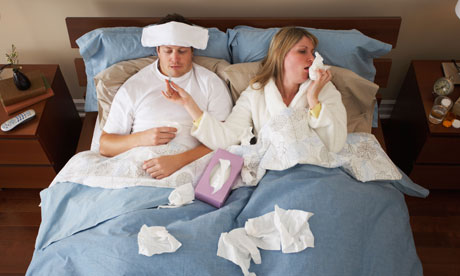
You've got to love this time of year, with its constant cacophony of coughs and sneezes. Don't go thinking you can just nip to the chemist for something to stop it though. Last week's news that cough medicines are little more than sugary placebos isn't much of a surprise. But if they don't work, what will? Honey? Whisky?
Booze is in fact a no-no, however great the temptation of a hot toddy may be. "Drinking does actually weaken your immune system," says GP Dr Louise Newson, a spokesperson for the Department of Health's Information Standard scheme. Honey and orange or lemon are a better bet, though. "Honey has good anti-bacterial properties and it helps to boost the immune system. It soothes the throat as well, so it has quite an instant effect," says Newson.
So you can put the kettle on and hold the toddy. Except your drink shouldn't be all that hot, either, according to Kim Ford, a vocal coach based in Liverpool. "When I have a sore throat, I turn to clear, warm – never hot – drinks," she says. "These rehydrate the tissue and provide soothing warmth to relax the musculature. Milky drinks are soothing but can boost mucus production, which can aggravate your throat and bring on a tickly cough."
Hot orange and honey it is, then. But no. Hang on. Ford says you're actually better off with pineapple or mango juice. "They have properties which soften the larynx without leaving residue, so they're preferable to high citrus juices which can produce acids."
Plus there's all that vitamin C to be had in fruit juice, isn't there? Except, of course, although vitamin C has been found to have "modest but consistent effect in reducing the duration and severity of common cold symptoms" its cold-prevention powers are as anecdotal as the cranberry's mythical ability to prevent cystitis. But are we interested in the evidence, or the lack thereof? In spite of all this bad news about bad science, we're still buying cough and cold medicines, and we're still swallowing old wives' tales.
In one survey carried out by The Information Standard, 53% of respondents believed there was some truth in the old adage of "feed a cold, starve a fever" and almost a quarter of respondents said they'd eat more in a bid to recover if they had a cold. Unsurprisingly, Dr Newson says the notion of feeding a cold is "absolute rubbish. A cold often comes with a fever anyway, so how are you supposed to tell?"
But however many studies fail to pinpoint the exact healing properties of chicken soup, we still turn to family and folk remedies in times of medical need. We should probably just be taking paracetamol, but where's the fun in that? Like a plaster on an uncut knee, sometimes a touch of the placebo effect is needed to make us feel better. Which is why my friend Ashleigh serves her son manuka honey with a medicine spoon: "The spoon is good for effect."
A completely unscientific straw poll of friends and colleagues suggests a predilection for childish fare in times of phlegm and mucus, particularly soft-boiled eggs and soldiers. Five people tell me, emphatically, about the medicinal properties of Heinz Cream of Tomato soup, while my friend Ella's go-to is toast and spaghetti hoops. "Can't cure a cold without them," she insists. "We were always given Lucozade if we'd been sick, presumably to rehydrate and replenish salts," says my friend Lucy. "No idea if it worked."
Just as the brand magic emanating from a bottle of cough syrup can make us think we're feeling better, so our sick-day comfort foods can work psychosomatic wonders on our poor, mucus-filled brains. Face it: spooning your way through a bowl of tomato soup is infinitely more comforting than swallowing painkillers - so really, what does it matter if these cures are only placebos?

